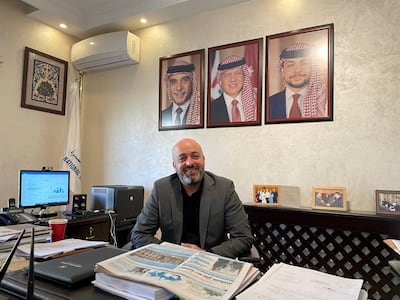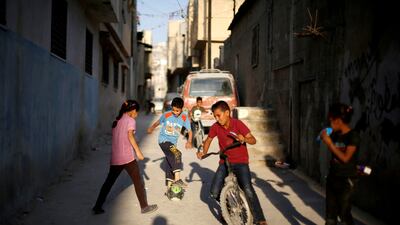The head of a Jordanian civil organisation involved in drafting child protection legislation has rejected criticism that the planned law is “too western” and “subverts Islam”.
Mohammed Mogdadi, secretary general of the National Council for Family Affairs — which aims to ensure a better quality of life for Jordanian families and children — said on Friday that the draft law conforms to a UN convention that Jordan signed up to 16 years ago.
The Children's Rights bill, which the government submitted to Parliament for approval last month streamlines rights and obligations present in existing legislation and does not introduce new ones, Mr Mogdadi told The National.
“In a way, the Children's Rights law is a constitution for children against which future progress can be measured,” Mr Mogdadi said.

Islamist and ultranationalist MPs have criticised the proposed law as subverting Islam and as inspired by western values.
Some Jordanians have also attacked the bill on social media, particularly clauses related to freedom and privacy, which they say undermine religious values.
However, other Jordanians see the legislation as helping modernise the country.
The NCFA was established by royal decree in 2001 and is presided over by Queen Rania. Since 2015, the organisation has been in talks with the government and Parliament to write the new law.
All significant powers in Jordan are with the monarch, King Abdullah II, and passing legislation is mostly a formality, especially when it comes to national politics, security and foreign affairs.
But the 130-member, mostly tribal parliament has some leeway when it comes to social legislation in the mostly conservative country.
In response to criticism from MPs and members of the public, Mr Mogdadi said the law is based on the 1989 UN Convention on the Rights of the Child.
Jordan signed the convention in 1991 and ratified it in 2006, after registering reservations on clauses that allow adoption from outside the child’s home country and allow them the choice of religion.
There is nothing in the draft law, which is yet to be debated by parliament, that has not been already put into effect in Jordan, Mr Mogdadi said.
He cited a Jordanian law that ratified the UN convention in 2006 and the wider laws applicable in the kingdom — such as a clause in the constitution guaranteeing personal freedom.
“The constitution guarantees personal freedom to all and did not specify man, woman or child,” he said.
Criticism on social media has focused on a clause in the draft law that says the child “has a right that his or her private life be respected”.
Critics say this undermines the role of parents and religious mores.
The clause also bans subjecting the child “to any oppressive interference or illegal measure in his or her life, family, home or correspondence”.
Mr Mogdadi said such rights are not absolute in Jordan and that the same clause emphasises the application of “the rights and obligations of his or her parents”.
“The draft law refers 11 times to the need to conform to the related laws,” he said.
Those who helped draft the legislation were careful to ensure that clauses they regarded as remotely sensitive were removed before the law went before Parliament, he said.
Mr Mogdadi gave the example of the removal of a clause that would have included kindergarten in compulsory education — which is currently from grades 1 to 10 in Jordan.
Despite removing this, Mr Mogdadi said he is still seeing tweets falsely claiming that small children will now not be able to go to Quran learning centres from an early age, because they would have to go to kindergarten.
“Some people are reading and analysing beyond what the actual clauses say,” he said.
“They don't seem to have read the text.”


